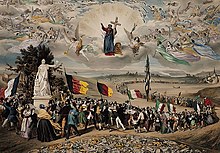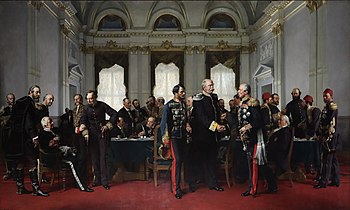Rise of nationalism in Europe

The rise of nationalism in Europe was stimulated by the French Revolution and the Napoleonic Wars.[1][2] American political science professor Leon Baradat has argued that “nationalism calls on people to identify with the interests of their national group and to support the creation of a state – a nation-state – to support those interests.” Nationalism was the ideological impetus that, in a few decades, transformed Europe. Rule by monarchies and foreign control of territory was replaced by self-determination and newly formed national governments.[3] Some countries, such as Germany and Italy were formed by uniting various regional states with a common "national identity". Others, such as Greece, Serbia, Bulgaria, and Poland were formed by uprisings against the Ottoman or Russian Empires.[4] Romania is a special case, formed by the unification of the principalities of Moldavia and Wallachia in 1859 and later gaining independence from the Ottoman Empire in 1878.
Background

National awakening also grew out of an intellectual reaction to the
Pre-1848 revolutions
- 1789, French Revolution,national assembly.
- 1797- Sister Republicsin Italy
- 1804–15, Serbian Revolution against the Ottoman Empire
- 1814, War on independence)
- 1821–29, Greek War of Independence against the Ottoman Empire
- 1830, Croatian national revival
- 1830–31, Belgian Revolution, Revolution in Poland and Lithuania
- 1846, Uprising in the Greater Poland
The struggle for independence
A strong resentment of what came to be regarded as

In Hungary,
Nationalism's growth and export

The invention of a symbolic
Now, within the modern era, nationalism continues to rise in Europe, but in the form of anti-globalization. In a study recently conducted, researchers found that Chinese import shock from globalization leads to uneven adjustment costs being spread across regions of Europe. In response, there has been an increase in support for nationalist and radical-right wing parties in Europe that promote anti-globalist policies.[10]
Revolutionary organizations
- Serb revolutionary organizations
- Greek revolutionary organizations
- Albanian revolutionary organizations
- Internal Macedonian Revolutionary Organization
References
- S2CID 154890372.
- ISBN 978-0-8078-6905-5.
- ^ slideshare[not specific enough to verify]
- ^ Baradat, Leon P. Political Ideologies: Their Origin and Impact, 10th ed. Upper Saddle, NJ: Pearson, 2009, 44.
- ^ Baradat 54-5.
- ^ ISBN 978-1-4008-2968-2.
- ISBN 978-0-521-27485-2.
- ISBN 978-0-521-27458-6.
- ^ Schroeder, The Transformation of European Politics 1763–1848 (1994) pp. 716-18
- ^ Colantone, Italo, and Piero Stanig. "The trade origins of economic nationalism: Import competition and voting behavior in Western Europe." American Journal of Political Science 62.4 (2018): 936-953.
See also
- Communitarianism
- Cultural identity
- Expansionism
- Identity politics
- Intercultural competence
- Irish nationalism
- National flag
- National liberation movements
- National personification
- National romanticism
- Society of the United Irishmen
- Nation state
